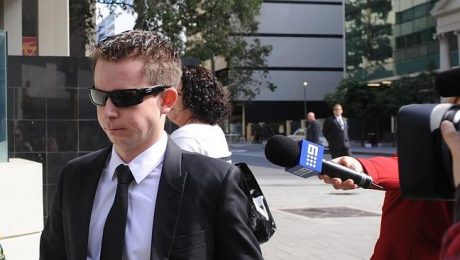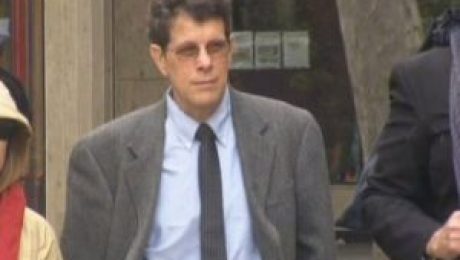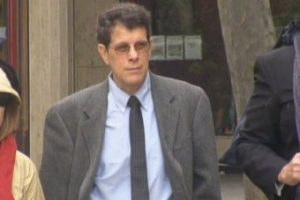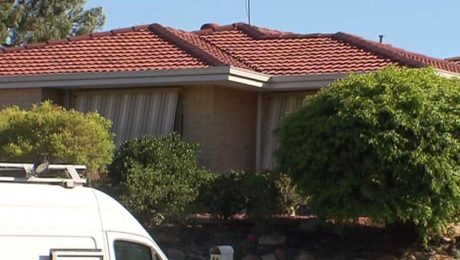Global porn ring: WA detective jailed over child images
Lynton John Moore, 30, was one of hundreds of men arrested after a global operation to track down the client list of a Canadian-hosted website which allowed customers to trade and purchase child sex images and videos.
In June, Moore was raided by his WA police colleagues who found more than 20,000 images and videos featuring boys as young as seven being exploited.
He also refused to hand over the password to the hard disks containing the images – which Judge Ronald Birmingham said were “vile and degrading”.
“To say these images were disturbing is an understatement,”
Judge Birmingham said.
Moore, who briefly worked as a teacher before joining the police, was a decorated detective when he was arrested, having received a commendation for attempting to revive a murder victim, and being involved in church activities.
But lawyer Mark Andrews said his client also had deep underlying emotional and psychological issues including a lack of strategies to cope with job stresses.
He had lost his job as a result of the charges, Perth District Court was told, and as a former detective he will have to serve his sentence in a segregated special handling unit.
Moore pleaded guilty to two counts of possessing the material found in his home, and was sentenced to two years and six months in prison. He will be eligible for parole.
In all, more than 60 men and over 400 charges have been laid as part of Operation Thunderer, the Australian arm of the global operation emanating out of Canada.
That operation, codenamed Project Spade, was launched three years ago by Toronto police and is believed to have disbanded a global child abuse ring, and led to the arrest of almost 350 suspects worldwide.
Seven men from WA – including priests and teachers – were last week charged with various offences related to their alleged involvement.
- Published in media
US tourist Jerome Rubin jailed over head-on Perth crash which killed his wife, 2yo girl
An American man has been sentenced to 18 months in jail for causing a crash on Perth’s outskirts that killed his wife and a toddler, and injured four others.
Jerome Rubin, 61, from Massachusetts drove on the wrong side of the road in Bedfordale in March this year, and crashed head-on into another car.
Rubin’s wife Joan, 60, died at the scene, while a two-year-old girl who was in the other car, Carmen Julius, died in hospital the next day.
Rubin’s daughter was injured along with the father, mother and grandfather of the toddler.
The District Court was told despite road signs showing the road was a single lane, Rubin believed he was still driving on a dual carriageway.
His lawyer Mark Andrews described his client as a man of “impeccable character” who had no previous traffic or criminal convictions.
He said Rubin had wanted to take part in mediation with the toddler’s family but they had refused, and Mr Andrews said his client respected their decision.
“He sits before you a broken man,” Mr Andrews told the judge.
“He’s racked with the guilt knowing he caused the death of his own wife … and Carmen … and caused serious injury to his own daughter and three other people.”
Mr Andrews said the crash was the result of Rubin’s unfamiliarity with driving in Australia and he had otherwise been an extremely cautious and conscientious driver.
Judge Michael Bowden accepted that Rubin was genuinely remorseful and that he was of otherwise excellent character, but he said the offences were so serious that an immediate jail term was needed.
He also accepted that jail would be difficult for Rubin because of his age and poor health and because he was far away from his family.
“[But] at the end of the day, it’s so serious because of the deaths of two people, the grievous bodily harm to three others and the bodily harm to another,” Judge Bowden said.
“Regrettably, a suspended sentence would fail to adequately reflect the serious nature of the offences.”
Rubin will have to serve nine months before he can be released.
- Published in media
Elderly man who allegedly strangled wife granted bail
A TERMINALLY ill man charged with murdering his 83-year-old wife told police he wanted to put her out of her misery, a Perth court has heard.
Harold Barclay, 85, is accused of strangling to death his wife Nancy, who had Alzheimer’s disease, at their Alexander Heights home on January 24.
Mr Barclay was initially taken to hospital but was later moved to Casuarina prison.
The WA Supreme Court was told on Wednesday during a bail application hearing that Mrs Barclay failed to take her sleeping tablets and Mr Barclay found her sitting at a dining table at 5am the next day.
Mrs Barclay collapsed when he tried to help her and he then allegedly strangled his wife, later telling police he wanted to put her out of her misery.
- Published in media
Law confusion keeps drug seller out of jail
A Perth woman caught selling synthetic cannabis from her Innaloo gift shop has avoided jail after waiting 31/2 years to be sentenced because of confusion surrounding synthetic drug laws.
When police raided Vivienne Hill’s Morris Place store Chuffed Gifts and More in May 2013, they seized 4.6kg of “green leafy material”, $12,000 in cash and a further $250,000 at her Bayswater home.
After an extensive analysis of the material, it was found 927g contained the banned psychoactive substance UR-144.
Hill pleaded guilty to possessing a synthetic cannabinomimetic with the intent to sell or supply. A cannabinomimetic substance has similar effects to cannabis.
She was not convicted in relation to the remainder of the material because the prosecution could not prove it was illegal.
The maximum sentence for that offence is up to 25 years jail and a fine up to $100,000, but District Court Judge Michael Gething last month gave Hill a 12-month suspended jail term and a $25,000 fine, partly because of the “significant delay” between her being charged and sentenced.
“You’ve had this offence hanging over you for a period of three years and in particular hanging over you the very real prospect of going to prison,” Judge Gething said.
The $262,000 was returned to Hill after it was found the money was proceeds of her legitimate business.
Prosecutor Hannah Milligan said the State had grappled with what was a “fairly new type of prosecution” because the law surrounding the prohibition of synthetic cannabinomimetics was different to the law surrounding other illicit substances.
Ms Milligan said the delay was also because prosecutors needed to obtain an expert neuropharmacological report to establish whether the chemical compounds were prohibited.
Hill’s lawyer Mark Andrews said his client did not set out deliberately to sell illegal drugs and went to “considerable lengths” to ensure the products she stocked were lawful, however she relied solely on information from her suppliers.
Mr Andrews said his client was not prosecuted for a majority of the material because she was charged when synthetic drug manufacturers were playing a “cat-and-mouse” game with the government by tweaking chemical compounds as soon as they were banned.
“I think it’s fair to say that most of that delay, and no criticism is levelled at the State for this because it was an uncertain area of the law, is attributable to the fact that there was some confusion over the prevailing lawful position,” he said. “So of course if our legislatures and prosecutors and courts are somewhat confused about the true position, one can readily understand how someone like Ms Hill could likewise be led into error in relation to whether a substance is prohibited or not.”
State Parliament passed new legislation in October 2015 to clamp down on the sale and supply of synthetic drugs, closing the legal loophole exploited by manufacturers.
The new laws banned the sale, supply, manufacture, advertising and promotion of any psychoactive substance that was not already captured by existing legislation.
- Published in media
Ben Cousins ‘likely to avoid jail’ over drug charge
A LEADING Perth criminal lawyer says there is “little chance” that fallen footballer Ben Cousins will be jailed if convicted over his drug charge.
Mark Andrews said Cousins, 33, would most likely escape with a fine or community order and the charge of possessing a prohibited drug with intent to sell or supply might be downgraded to simple possession.
It comes as an ex-staffer at the Teen Challenge rehab facility, where Cousins was receiving treatment, said it was likely he would be given a second chance to attend the program.
Cousins was charged with possession of 4.56g of methylamphetamine at Esperance airport on Tuesday.
Mr Andrews said the amount went beyond the 4g threshold, meaning the case must go to the District Court instead of being dealt with by a magistrate.
“At the end of the day, 4.5g is not a lot of drugs,” Mr Andrews said.”I have got clients who use up to 1g a day.”
Last year Mr Andrews represented WA Police Commissioner Karl O’Callaghan’s son, Russell, who admitted attempting to manufacture methylamphetamine and was sentenced to 16 months jail.
“Even if (Cousins) was convicted of possession with intent, I think it is very unlikely he would be sent to jail,” Mr Andrews said.
“It is more likely he would be sentenced to some form of intensive supervision order, where he would undergo rehab and regular urine testing for drugs, or a conditional suspended term of imprisonment which is the same thing coupled with a suspended jail term.
“If he breaches that sentence by not doing rehab or reoffending, he would likely be ordered to do the jail time.”
Mr Andrews said Cousins’ lawyers would almost certainly argue the drugs were for his personal use only.
“Because the amount is in excess of 2g, there is a legal presumption that he intended to sell or supply the drug,” he said.
“But it is a rebuttable presumption, and it has only got to be rebutted on the balance of probabilities, which is the lower standard.”
In a sign of hope for the fallen football star, a staff member who worked at Teen Challenge for eight years said it was likely the Esperance rehabilitation facility would let him return if he wanted to get better and comply with the rules.
The staff member, who did not want her name published, said returning to the program could change Cousins’ life.
- Published in media
Arrest warrant is the shock of Hughes’ new trial
A warrant has been issued for the arrest of the eminent historian and art critic Robert Hughes, who failed to appear in an Australian court to answer dangerous driving charges.
Mr Hughes’ lawyer said that the Australian-born critic, who still suffers injuries from the crash, was advised by an orthopaedic surgeon that he was not well enough to travel from his home in New York to Perth, where he was due to present himself before magistrates.
Mr Hughes, 64, has long been derided by scornful Australians as “the fatal bore”, after his most famous work, The Fatal Shore. But his transformation into one of Western Australia’s most wanted men is the latest twist in an extraordinary saga which began when he almost died in the car crash on a west-coast fishing trip three years ago.
The prosecution argues that Mr Hughes, who was also filming the BBC documentary Beyond the Fatal Shore at the time, was speeding and driving on the wrong side of the outback road when he collided with another vehicle.
The charges of dangerous driving and causing grievous bodily harm were dropped when two witnesses were charged with conspiracy to pervert the course of justice.
The witnesses, one the driver of the second car, had tried to extort £10,000 from Mr Hughes in exchange for false testimony. “It’s amazing what sort of low-life you can run into on the road,” Mr Hughes said when the case was dropped in May 2000.
Six months later the Australian supreme court ruled that the trial should be reopened.
Mr Hughes’ lawyer, Mark Andrews, said he was mystified by the prosecution’s pursuit of his client, who is internationally respected but in Australia shares the scorn many reserve for high-profile expatriates who criticise the country they have left.
“He’s no Christopher Skase,” Mr Andrews said, referring to the fugitive Australian businessman who evaded arrest for years in exile in Spain.
In a statement from New York, Mr Hughes said: “Let me make this quite clear: nobody has a greater desire to dispose of this matter than I. When I last appeared, voluntarily and without any compulsion, I was acquitted.”
Mr Hughes travelled to Australia last year for the funeral of his son, who committed suicide in the Blue Mountains.
The court has set another hearing date for July 4 to give Mr Hughes time to recover.
Since you’re here…
… we have a small favour to ask. More people are reading and supporting our independent, investigative reporting than ever before. And unlike many news organisations, we have chosen an approach that allows us to keep our journalism accessible to all, regardless of where they live or what they can afford.
The Guardian is editorially independent, meaning we set our own agenda. Our journalism is free from commercial bias and not influenced by billionaire owners, politicians or shareholders. No one edits our editor. No one steers our opinion. This is important as it enables us to give a voice to those less heard, challenge the powerful and hold them to account. It’s what makes us different to so many others in the media, at a time when factual, honest reporting is critical.
Every contribution we receive from readers like you, big or small, goes directly into funding our journalism. This support enables us to keep working as we do – but we must maintain and build on it for every year to come. Support The Guardian from as little as $1 – and it only takes a minute. Thank you.
- Published in media
SAS pair in WA court over ‘miscarriage plot’
Two Special Air Service soldiers have appeared in court following allegations they were involved in a plot to attack a woman and cause her to have a miscarriage.
The West Australian police organised crime unit has been investigating allegations that one of the soldiers, whose girlfriend was pregnant, was involved in a plot to recruit a colleague and others to attack the woman and cause a miscarriage.
The two soldiers, whose identities are suppressed, are due back in Perth Magistrates Court this month, when more charges are expected to be laid against a number of people. The two soldiers were charged last Tuesday. – the day before Prime Minister John Howard visited Western Australia to see three unit citations presented to the regiment.
One of the soldiers was in Perth Magistrates Court yesterday morning on charges of possessing an unlicensed firearm, unlicensed ammunition and a silencer. He has also been charged with conspiring to commit an indictable offence, but that charge was not listed yesterday.
The soldier’s lawyer, Mark Andrews, asked for a suppression order on the grounds that his client had been in the SAS for eight years.
Mr Andrews said the SAS had a strict policy relating to anonymity of its members. “There is a very real security risk if he is named or has his image published,” he said.
Chief Magistrate Steven Heath granted the order, stating: “If he was acquitted, the impact of publication would be such as to render his employment non-viable.”
Later in the morning, another SAS soldier appeared on a charge of conspiring to commit an indictable offence. He was represented by lawyer Vesna Amidzic and remanded for a committal mention in September. Ms Amidzic did not initially apply for a suppression order but she returned to court later to seek the order. Mr Heath made the suppression order and remanded the case to June 29.
- Published in media
WA child psychiatrist on sex abuse charges
- Published in media
Top cop’s injured son faces rehab
Russell O’Callaghan, 29, was badly burnt when a blast tore a hole through the roof of a state housing unit in Perth. He has been in hospital since the incident on March 20 and is in a stable condition.
After the explosion, which also injured five others, he was charged with attempting to manufacture amphetamine.
His first court appearance was yesterday in Perth Magistrates Court but he was excused from attending after his lawyer Mark Andrews presented a medical certificate.
Mr Andrews told the court it was not known when Mr O’Callaghan would be discharged from hospital but on his release he would go to a drug rehabilitation facility. He said a preliminary report from the state government chemist had shown that the lab would have produced only 1.2g of amphetamine.
“I don’t think anyone is suggesting that this was a sophisticated, commercial operation,” he told magistrate Giuseppe Cicchini.
To avoid a conflict of interest, a lawyer from the Director of Public Prosecutions, instead of the police, appeared for the prosecution yesterday.
Another man charged over the incident, Jason Lee Marzoli, also appeared in court and was granted bail on strict conditions, including a 12-hour curfew.
He lived in the home where the explosion took place and as part of his bail conditions is not allowed to return to the property unless he has permission from the police.
Both Mr O’Callaghan and Mr Marzoli are due back in court later this month.
Commissioner O’Callaghan has said he was shocked to see the extent of his son’s burns and he had come “within a hair’s breadth of losing his life”.
The incident led the commissioner to speak of the tension between trying to be a good dad and a good top cop.
“There’s always that conflict between being the Commissioner of Police and being the father,” an emotional Mr O’Callaghan said at the time.
- Published in media
Robert Hughes faces arrest
The art critic Robert Hughes faces arrest if he steps on West Australian soil after he failed to appear in court on dangerous driving charges yesterday.
Perth magistrate Len Roberts issued the arrest warrant for Hughes, despite his claim that he was unfit to travel from his home in New York.
Outside court, Hughes’s lawyer, Mark Andrews, insisted his client wanted to return to clear his name. “He’s no Christopher Skase – he’s returned at great expense in the past,” Mr Andrews said of Hughes, the internationally renowned Australian critic.
And in a statement issued from New York last night, Hughes said: “Let me make this quite clear: nobody has a greater desire to dispose of this matter than I. When I last appeared, voluntarily and without any compulsion, I was acquitted.”
Hughes was charged with dangerous driving causing grievous bodily harm, and dangerous driving causing bodily harm, after a head-on crash between his rental car and another vehicle south of Broome on May 28, 1999. He spent five weeks in a coma after the crash.
He appeared for his two-day trial in Broome in May 2000 but the charges were dropped after police were told the second car’s driver and a private investigator were conspiring to pervert the course of justice. Darren William Kelly and Rodney Stephen Bridge were later charged with trying to extort $30,000 from Hughes in exchange for giving false testimony or withholding testimony.
But the charges against Hughes were reinstated when the Director of Public Prosecutions successfully appealed against the Broome magistrate’s decision.
Mr Andrews said he now understood why Hughes feared he would not get a fair trial. He was perplexed about the vigour with which the prosecution was pursuing Hughes.
Mr Andrews said Hughes had never refused an order to appear in court and had kept the prosecution and court informed about his medical condition.
He had been advised by orthopaedic specialist David Helfet last month that he was currently unable to undertake the 24-hour flight from New York to Perth.
Dr Helfet’s report said Hughes’s leg, fractured in the accident, had not healed.
“He’s not going to return to WA against medical advice, regardless of whether a bench warrant was issued,” Mr Andrews said.
“There’s nothing they can do. Are they going to seek to extradite him from New York?”
Prosecutor Alan Sefton suggested the art critic be given time to recover before his next appearance.
“Let’s make it the 4th of July,” said the magistrate, apparently alluding to America’s Independence Day. “I think that’s appropriate,” Mr Sefton said.
- Published in media




